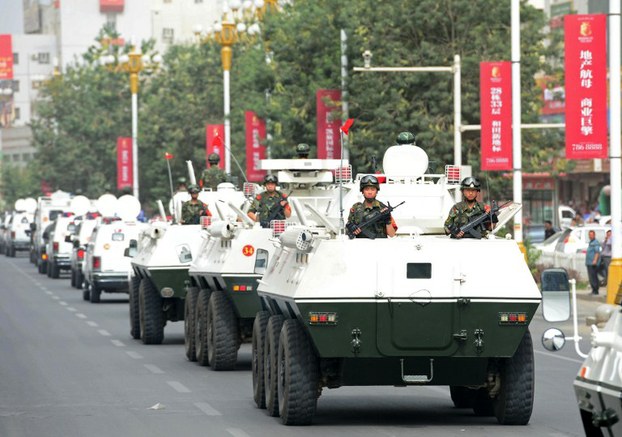




The brother of an innocent Uyghur bystander shot dead during an attack on a police station that left about 50 dead in northwestern China’s Xinjiang region has blamed the police for his death.
Rozi Osman, 49, was the only known civilian who was killed when police repelled a raid by a group of suspected Uyghurs on a police station in Yengisar township attacks in Bayingolin Mongol Autonomous Prefecture’s Bugur (in Chinese, Luntai) county last week.
Chinese state media reported that 40 “rioters,” six civilians, and four police officers were killed and 54 people were injured in the attack in Bugur city center, as well as simultaneous raids on the townships of Yengisar and Terekbazar, on Sept. 21.
Osman’s younger brother told RFA’s Uyghur Service that he had been farming his fields in Yengisar when he heard about the raids and called his sibling—whose restaurant is located near the township government building—to find out what had happened, but was unable to reach him.
“I ran to the bazaar to see my brother and when I arrived everything was blocked off, but I heard from bystanders that he had been shot dead,” Mamut Osman told RFA’s Uyghur Service.
“Then I saw his body lying in front of his restaurant and ran to him. I saw that he had been injured in the chest, but it wasn’t a knife wound. When I asked the police what happened to him, they said he was shot by ‘terrorists,’ but nobody said that the attackers had guns—not even the official news.”
Chinese police have been accused of randomly targeting Uyghurs in an anti-terror campaign launched in Xinjiang following deadly attacks blamed by Beijing on Uyghur separatists and Islamist insurgents seeking to establish an independent state.
The Xinjiang region, which is home to millions of Turkic-speaking Uyghurs, has seen an upsurge in violence that has left hundreds dead since 2012.
Rights groups accuse the Chinese authorities of heavy-handed rule in Xinjiang, including violent police raids on Uyghur households, restrictions on Islamic practices, and curbs on the culture and language of the Uyghur people.
Mamut Osman said that police had not allowed him to see his brother’s body after initially identifying him in the street, and had even refused to return it to his family for burial.
“In the current situation in Bugur, we aren’t able to question ‘Why?’ and nobody would answer our question anyway, because of how busy officials and police have been after the incident,” he said.
“We are still waiting for a reasonable explanation for my brother’s death.”
‘Selective attack’
A merchant who runs a store near the police station where Rozi Osman was shot dead said he “was killed by a shot from the police.”
Speaking on condition of anonymity, the merchant said that he had closed his store when he heard a blast, and watched through his window as the suspects set off a bomb at the gate to the police station and threw explosives at vehicles inside the yard.
He said that after a failed attempt to bomb the nearby township government building, the suspects returned and circled the police station but deliberately avoided civilians in the area.
Shortly afterwards, security forces were deployed to the scene, where the merchant said they engaged the suspects and began shooting.
“The rioters had attacked only police and officials, no civilians were intentionally targeted,” the merchant said, suggesting that more civilians could have been shot.
“All the deaths and injuries occurred after the armed forces arrived. The rioters were very selective about their attack … so I believe that all the casualties among civilians were caused by the armed forces.”
Local officials and witnesses had told RFA that 12 were killed during the bomb attack at the police station in Yengisar. The number of fatalities in Bugur and Terekbazar was not immediately known, they said.
Delayed reports
The Yengisar merchant questioned why the state media had waited four days to report the death toll from the attacks at 50, revising it up from an initial count of just two, suggesting local officials feared information about police shooting innocent bystanders would incense the public.
“That is the reason why officials delayed reports on the incident—if reporters were in Yengisar township on that day, they would have seen who caused most of the deaths and injuries, and the rage of the Uyghur and Han Chinese public would have been directed toward the authorities.”
Earlier this week, Brussels-based reporter watchdog International Federation of Journalists (IFJ) criticized the Xinjiang regional government for “deliberately delaying reports” about the attacks, saying it had violated a law requiring it to inform the public and “irresponsibly [placed] people in danger.”
IFJ urged China’s President Xi Jinping and Premier Li Keqiang to demand that Xinjiang chairman Nur Bekri and Communist Party secretary Zhang Chunxian “investigate all incidents and ensure reports are released as a matter of urgency.”
The Sept. 21 attacks mark the latest to rock the restive Xinjiang region, where Beijing has launched an anti-terror campaign to contain escalating violence blamed on Uyghur separatists, and where many Uyghurs complain of repression by the Chinese authorities.
Uyghurs claim to have long suffered ethnic discrimination, oppressive religious controls, and continued poverty and joblessness, as more Han Chinese move to the region.
Reported by Shohret Hohshur for RFA’s Uyghur Service. Translated by Shohret Hohshur. Written in English by Joshua Lipes.